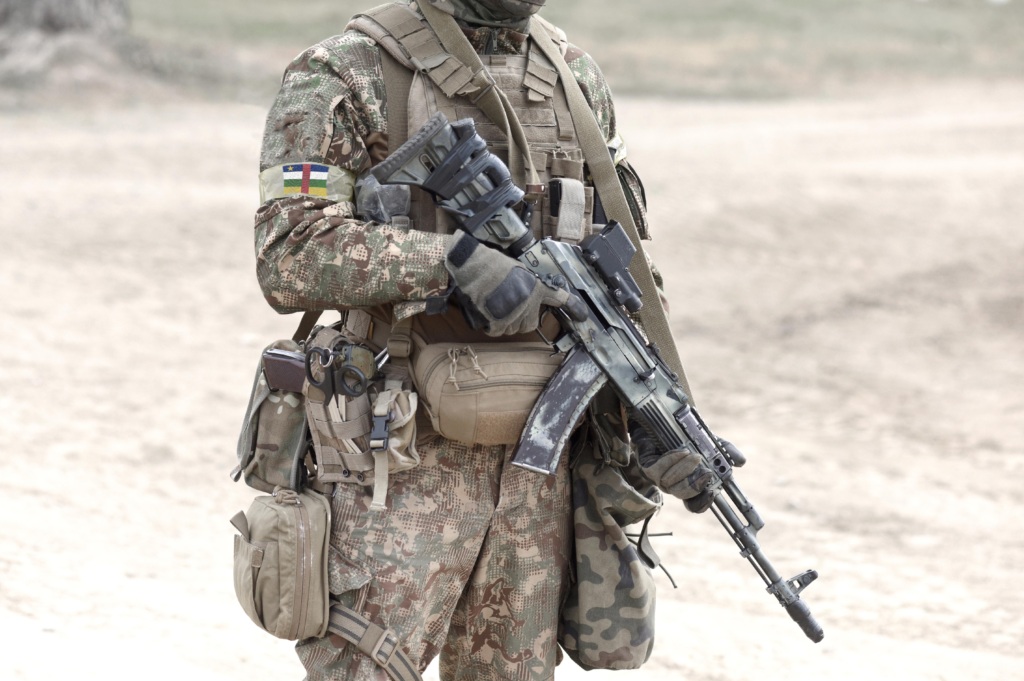
Central African Republic (CAR)
362
The Wagner Group committed more than 362 incidents of violence against civilians, resulting in at least 786 fatalities, according to ACLED data.
10
The group controlled at least 10 mines throughout the country, including the central and economically significant Ndassima mine in the Ouaka prefecture.
100
Between 2018 and 2024, the Wagner Group in the Central African Republic was involved in over 100 clashes.
BACKGROUND
The Central African Republic (CAR) has been embroiled in a civil war since late 2012. In early January 2018, the Wagner Group deployed to the CAR as part of a security contract with President Faustin-Archange Touadéra’s government. The primary objectives of the deployment were to defend the capital, Bangui, from rebel groups; train CAR military forces (the Forces Armées Centrafricaines or FACA); provide personal security to the president; and ensure site security for gold and diamond mines. The CAR government allowed the Wagner Group to use these mines to fund its operations, a practice the group had previously employed in Syria and Sudan. In 2021, the Wagner Group adopted a strategy of sustained offensive operations against rebel groups, which allegedly included human rights violations, sexual violence, looting, and theft, particularly in the town of Bambari and the villages of Aïgbado and Yanga.
Violence against civilians
According to the Armed Conflict Location & Event Data (ACLED) project, between 2018 and 2024, the Wagner Group in the CAR was involved in over 100 battles and committed more than 362 incidents of violence against civilians, resulting in at least 786 fatalities. To support its operations throughout the CAR’s diverse terrain, the Wagner Group constructed at least 47 facilities, r anging from training headquarters in Bangui to airstrips and fuel depots scattered throughout urban and remote areas of the country. The group controlled at least 10 mines throughout the country, including the central and economically significant Ndassima mine in the Ouaka prefecture. Due to the Wagner Group’s security mandate and the guerilla warfare endemic to the civil conflict, much of the group’s violence against civilians occurred near their bases and in populated areas as they captured and defended key CAR infrastructure and mining enterprises.

Alleged War Crimes
Government forces and Wagner personnel control much of the western and southern regions of the CAR. Wagner fighters killed civilians as they defended and secured the capital, Bangui, and other major towns from rebel groups. In the southeastern part of the country, such as in the towns of Bambari and Bria, violence represents incidents of alleged war crimes committed during offensive pushes by FACA forces and Wagner fighters. The CAR shares a porous northern border with Chad, where rebel forces often seek refuge. The violence in the northwestern cities of Degaulle, Bocaranga, and Paoua demonstrates the instability in this region as FACA and Wagner fought against rebel groups. Wagner bases are strategically located along this northern border to bolster security efforts, and the distribution of these bases throughout the country reflects the areas under the control of the government and the Wagner Group.
There have been several notable instances of violence against civilians during the Wagner Group’s operations in the CAR. One of the most severe occurred on February 15, 2021, in the contested town of Bambari. During a search for rebel fighters, FACA forces and Wagner personnel killed between 12 and 20 civilians, with some executed in cold blood and others gunned down from the ground and helicopters. According to reporting by CNN and the Sentry, Wagner and FACA fighters committed acts of sexual violence in the course of this attack.
Another significant incident took place on January 16 and 17, 2022, in the villages of Aïgbado and Yanga. In this case, Wagner personnel, alongside Christian militias, launched an attack against the armed, primarily Muslim, rebel group “Union for Peace in the Central African Republic.” Wagner fighters and allies targeted Muslim residents of Aïgbado and Yanga villages, resulting in the deaths of at least 30 to 70 unarmed civilians, according to ACLED.
Violence Escalation
Wagner personnel numbers in the CAR peaked at over 2,300 in 2021. Violence escalated to its highest point in mid-2021, with Wagner fighters killing at least 563 civilians between June 2021 and February 2022, according to ACLED data. As Russia shifted its focus to the Sahel in late 2023 and 2024, the CAR government sought to leverage a security partnership with U.S. private military company Bancroft to encourage further engagement with Wagner and Russia’s Africa Corps. Following significant territorial gains between 2021 and 2023, Wagner is expected to refocus on security and mining activities in 2024 under the new auspices of Russia’s Africa Corps.
About this Project
Learn more about our work investigating and documenting Russia's irregular warfare strategy.
